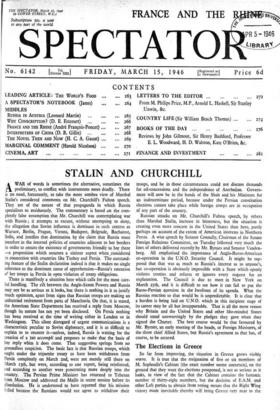STALIN AND CHURCHILL
There is manifestly a situation here which calls for the most care- ful handling. The rift between the Anglo-Saxon Powers and Russia may not be as serious as it looks, but there is nothing in it to justify much optimism, apart from signs that Russian troops are making an unhurried retirement from parts of Manchuria. On that, it is stated, the American State Department has received a reply from Moscow, though its nature has not yet been disclosed. On Persia nothing has been received at the time of writing either in London or in Washington. This silent disregard of urgent communications is a characteristic peculiar to Soviet diplomacy, and it is as difficult to explain as to counter it—unless, indeed, Russia is waiting for the creation of a fait accompli and proposes to make that the basis of her reply when it does come. That suggestion springs from no groundless suspicion. The basic fact is that Russian troops, which ought under the tripartite treaty to have been withdrawn from Persia completely on March 2nd, were not merely still there on March 13th, but were, according to one report, being reinforced, and according to another were penetrating more deeply into the country. The Persian Prime Minister has returned to Teheran from Moscow and addressed the Mallis in secret session before' its dissolution. He is understood to have reported that his mission failed because the Russians would not agree to withdraw their
troops, and he in those circumstances could not discuss demands for oil-concessions and the independence of Azerbaijan. Govern- ment will now be in the hands of the Shah and his Ministers for an indeterminate period, because under the Persian constitution elections cannot take place while foreign troops are in occupation of any part of the country.
Russian attacks on Mr. Churchill's Fulton speech, by others than Marshal Stalin, increase in bitterness, but the situation is creating even more concern in the United States than here, partly perhaps on account of the extent of American interests in Northern Persia. A wise speech by Senator Connally, Chairman of the Senate Foreign Relations Committee, on Tuesday followed very much the lines of others delivered recently by Mr. Byrnes and Senator Vanden- berg. All emphasised the importance of Anglo-Russo-American co-operation in the U.N.O. Security Council. It might be sup- posed that that was as much to Russia's interest as to anyone's, but co-operation is obviously impossible with a State which openly violates treaties and refuses or ignores every request for an explanation. The Council is due to meet in New York on March 25th, and it is difficult to see how it can fail to put the Russo-Persian question in the forefront of its agenda. What the Russian reaction to that would be is unpredictable. It is clear that a burden is being laid on U.N.O. which in this incipient stage of its career may be all but insupportable. That is all the more reason why Britain and the United States and other like-minded States should stand unswervingly by the pledges they gave when they signed the Charter. The best course would be that favoured by Mr. Byrnes, an early meeting of the heads, or Foreign Ministers, of the three chief Allied States, but Russia's agreement to that has, of course, to be secured.


























